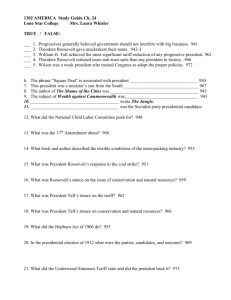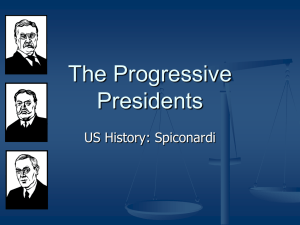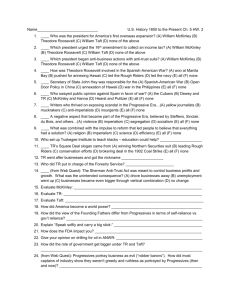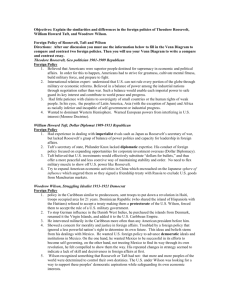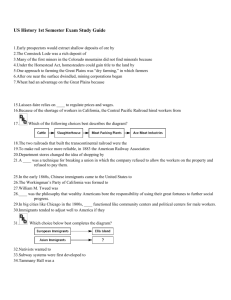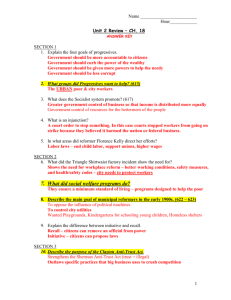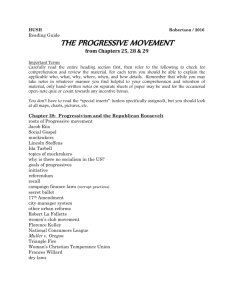Progressive presidential leadership notes1
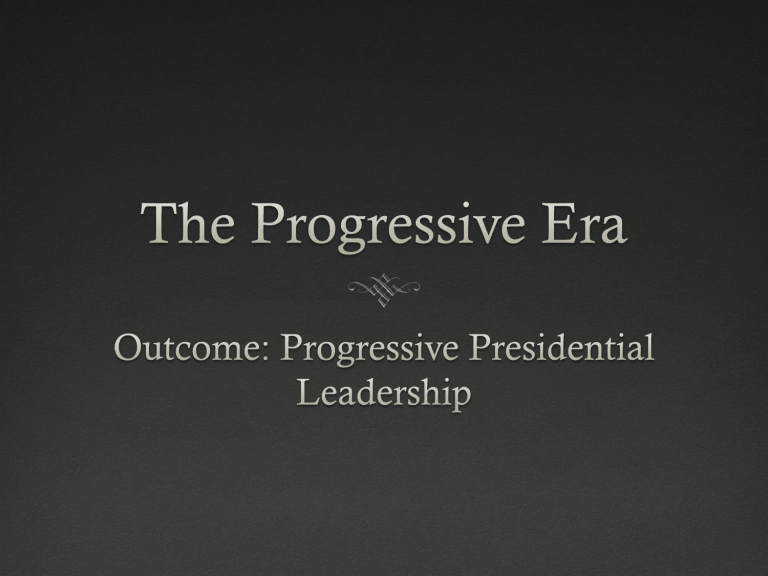
Theodore Roosevelt
Theodore Roosevelt e.
Presidential Style i.
Playful, fun, dramatic, loved the press and the public ii.
Expanded presidential power and controlled Congress iii.
“Big Government ” is needed to regulate “Big Business ”
Theodore Roosevelt f.
The Square Deal: Program for helping the common man i.
Some said he was a “ traitor to his own class” ii.
Settled Coal Strike of 1902
1.
TR forced owners to negotiate with the union
2.
TR threatened to use the army to run the mines
3.
Workers made gains with government on their side ( rare )
Theodore Roosevelt iii.
Worked to break up monopolies & end special privilege
1.
Nickname: “ trust-buster ”
2.
Used Sherman AntiTrust Act to break up the
Northern Securities railroad monopoly (JP Morgan)
3.
Started suits against Standard Oil and U.S.
Steel
4.
Signed Elkins Act ending railroad rebate practice
“Trust Buster”
Theodore Roosevelt iv.
Social Legislation
1.
Pushed passage of health laws (influenced by Upton Sinclair )
2.
Ex: Meat Inspection Act & Pure Food & Drug Act
3.
Conservation – set aside 240 million acres as protected public lands
William H. Taft
William H. Taft
2.
William H. Taft (1857-1930)
a.
Childhood & Early Life i.
Born into wealthy Ohio family ii.
Admired his father ---> lawyer, judge, Attorney General, Sec. of War iii.
Educated in law at Yale University iv.
Dream ---> to become Chief Justice of the US Supreme Court
William H. Taft b.
The Man
i.
Physically large
ii.
Honest, loyal, no vices
iii.
Poor speaker, lacked tact, and procrastinated
William H. Taft d.
Successes as President (R) 1909-1913 i.
Added more land to public parks & forests (not as much as TR) ii.
Broke up more than 90 monopolies, including Standard Oil in 1911 iii.
Set up the Dept. of Labor & Bureau of Mines to protect workers iv.
Supported the passage of the 16 th and 17 th Amendments v.
Established the 8 hour day for government workers
William H. Taft e.
Caused Split Between Progressives & Conservative Republicans i.
Signed Payne-Aldrich Tariff Act ---> raised tariffs
1.
Pleased big business
2.
Angered progressives and especially farmers i.
Appointed a Secretary of the Interior who:
1.
Favored industrial development of wilderness area
2.
Was slow to preserve public lands i.
TR became his #1 critic
Taft Was More
Conservative
William H. Taft g.
Election of 1912 (3-Way Race) i.
Progressive (R’S) supported TR & Conservative (R’s) supported Taft
1.
Taft wins the (R) nomination
2.
TR forms Progressive Bull Moose party (split weakens R party) ii.
(D) Woodrow Wilson is elected and TR is labeled “the spoiler ” h.
1921- named Chief Justice of the Supreme Court by President Harding i.
Served until 1930 ii.
Considered it the “ greatest honor ” of his life
Election of 1912
Woodrow Wilson
Election of 1912
Woodrow Wilson ii.
Successes came under his program called New Freedom
1.
Underwood Simmons Act (1913) lowered import tariffs
2.
Created the Federal Reserve System to stabilize banking
3.
Keating-Owen Act curbed the use of child labor
4.
Federal Farm Loan Act gave farmers low interest loans
5.
Worked for passage of Clayton AntiTrust Act (1914) which strengthened government’s ability to break up monopolies iii.
All 4 Progressive Era Amendments (16 th , 17 th , 18 th , 19 th ) went into effect while he was president
Woodrow Wilson d.
To Be Continued… i.
We will talk more about Wilson in the next two units:
1.
World War I
2.
The 1920s
